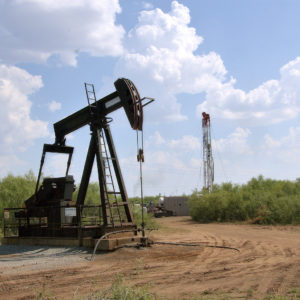Water is life. The slogan began as a catchphrase at the Dakota Access Pipeline this summer, but has been rapidly adopted by various other green groups concerned by potential environmental contamination from energy development. For years, fracking, which involves injecting pressurized fluid (often brine) into the ground to crack open bedrock and release petroleum supplies trapped underneath, has been of particular concern. A new report from the United States Geological Survey found that fracking in the Eagle Ford, Fayetteville, and Haynesville shale formations in Arkansas, Louisiana, and Texas are not a source of benzene or methane contamination in drinking water. The USGS study provides support for the energy industry, which has long argued that fracking is safe.
Unlike previous studies, the report analyzed the presence of methane and benzene in relation to the age of the groundwater. This allowed the researchers to separate naturally-occurring benzene and methane from contamination from leaking wells.
“Understanding the occurrence of methane and benzene in groundwater in the context of groundwater age is useful because it allows us to assess whether the hydrocarbons were from surface or subsurface sources,” said Peter McMahon, USGS hydrologist and study lead. “The ages indicate groundwater moves relatively slowly in these aquifers. Decades or longer may be needed to fully assess the effects of unconventional oil and gas production activities on the quality of groundwater used for drinking water.”
The researchers studied water samples from 116 domestic and public-supply wells. The nearest well was a mere 360 feet from a fracking station.
The USGS study determined the age of groundwater by looking at its depth and calculated the presumed rate at which hydrocarbons buried underground would rise towards the surface in order to come into contact with groundwater. They found that, for some instances of contamination, the sources occurred deep underground and had nothing to do with fracking.
“Eight of nine samples containing benzene had groundwater ages >2500 years, indicating the benzene was from subsurface sources such as natural hydrocarbon migration or leaking hydrocarbon wells,” the researchers wrote. The report went on to describe the methane contamination as “biogenic,” rather than from a shale formation.
Benezene was detected in 8 percent of the wells, but at very low concentrations. The highest concentration researchers found was still 40 times lower than the federal standard for drinking water.
Steve Everly, a spokesman for Texans for Natural Gas, praised the USGS study, noting that it was not the first study proving that fracking did not contaminate groundwater.
“This report comes less than a year after the U.S. EPA’s landmark study that also found no evidence of widespread water pollution from fracking,” Everly said. “It’s time to put to rest the false claim that the shale revolution has threatened Americans’ drinking water supplies, because the science clearly does not support it.”
The report is significant since the Haynesville shale formation is part of one of the largest fossil fuel resources in the United States. In April, the USGS studied the Bossier and Haynesville Formations on the Gulf Coast, discovering that the Haynesville formation alone contains an estimated 1.1 billion barrels of oil, 195.8 trillion cubic feet of natural gas, and 0.9 billion barrels of natural gas liquids.
Since these estimates presume existing extraction technology, the present supplies of natural gas and oil may be larger still.
“Changes in technology and industry practices, combined with an increased understanding of the regional geologic framework, can have a significant effect on what resources become technically recoverable,” said Walter Guidroz, Program Coordinator of the USGS Energy Resource Program. Guidroz explained that such technological advances are part of way the USGS revisits oil and gas basins to reevaluate its estimates of technically-recoverable resources.
Results like those of the USGS study are encouraging to the industry, which has encountered resistance from groups fearing that fracking and other oil exploration will cause environmental contamination.

